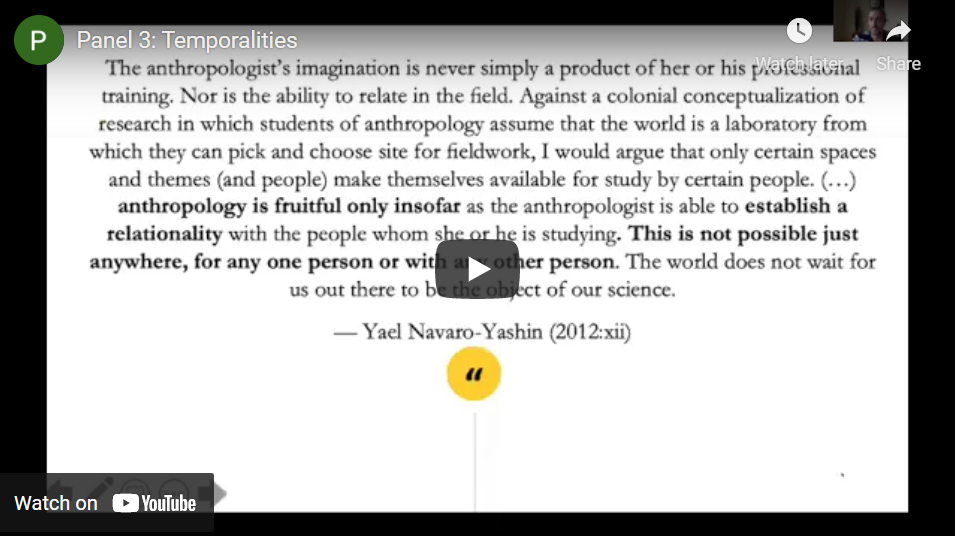Patchwork Ethnography Webinar
24-25 June 2021
Patchwork ethnography seeks to bring blackboxed and delegitimized ethnographic practices out of the closet. Working against the masculinist and ableist assumptions that undergird fieldwork, patchwork ethnography recognizes that researchers — particularly women, BIPOC, queer, trans, and disabled folx — have always constructed their ethnographic work through patchwork, whether due to personal obligations, issues of accessibility, or the neoliberal, precarious academic labor market. In this virtual conference, we seek to understand patchwork ethnography as the product of what feminist anthropologists have described as “intersecting responsibilities” in relation to the structural constraints of racism, sexism, and classism that researchers are entangled in and which shape our choices.
Patchwork ethnography acknowledges the multiple subject positions, positionalities, and complexities of researchers. Rather than imagining the researcher as a sovereign subject, patchwork ethnography allows us to think honestly about the vulnerabilities of researchers, and how we may produce anthropological knowledge that pushes against demands of mastery and control. The goal of this two-day conference is to generate a collective conversation about patchwork ethnography as theory, method, and/or as an advocacy tool for funding agencies.
This webinar is part of the Webinars on the Future of Anthropological Research initiative, supported by the Wenner-Gren Foundation for Anthropological Research. Special thanks to Nightingale Interpreting Services for ASL interpretation, Addison Verger at Rice University for tech support, and Zeynep Gizem Haspolat at Rice University for captioning.
Program Committee: Gökçe Günel, Saiba Varma, Chika Watanabe, Alexia Arani and Katie Ulrich.


Panel 1: Familial Entanglements
“Rethinking Distraction,” Kate McClellan (Mississippi State University)
“The ‘Guilty’ Daughter-Researcher: Doing Ethnography While Staying with Family during COVID in Assam, India,” Bhargabi Das (National University of Ireland)
“Methods of Motherhood: Scholarship at the Borderlands of Student and Mother,” Melinda González (Louisiana State University)
“The Creativity of Constraint,” Megan Moodie (University of California, Santa Cruz)

Panel 2: Sensory and Affective Attentions
“Family, Failure and Fatigue in the Field: A Patchwork of Exclusions,” Henni Alava (University of Jyväskylä)
“Quilted Aftermaths: Surviving, Researching, and Navigating Institutional Rigidness after Rape,” Jessica Lumanisha (Goldsmiths, University of London)
“‘Half Half Half’ Anthropology,” Michele Friedner (University of Chicago)
“Hearing the Ethnography, Foregrounding the Infrastructure,” Sareeta Amrute (University of Washington, Seattle)

Panel 3: Temporalities
“Fragmentary Ethnography: The Possibility of Impossibility in Living and Researching amidst Genocidal Remnants,” Jasmin Tabaković (University of Cambridge)
“Fieldwork Speculations,” Gisa Weszkalnys (London School of Economics)
“Patchwork Ethnography, Plastic Writing,” Can Evren
“When Fieldwork Makes You Sick: Debility, Access, and Fragmented Ethnography,” Emily Lim Rogers (New York University)


Panel 4: Collaboration and Activism
“Patchwork Ethnography & Disability Justice,” Erin L. Durban (University of Minnesota—Twin Cities)
“Re-thinking the “Here” and “There” of Fieldwork: A Collaborative Ethnography of Social Intimacy in La Petite Sicile, Tunis,” Margaux Fitoussi (Columbia University) and Rosa Sansone (University of Manchester) *Upon presenters’ request, this talk has not been recorded.
“COLA, Covid-19, and the Limits of Ethnographic Production amidst Graduate Precarity,” Sucharita Kanjilal (University of California, Los Angeles)
“Collaborative Research across the Global South: Studying New Consumer Cultures,” Tingting Liu (University of Jinan), Anna Cristina Pertierra (Western Sydney University), Ahtziri Molina (Universidad Veracruzana), Rosana Pinheiro-Machado (University of Bath), and Czarina Saloma-Akpedonu (Ateneo de Manila University)

Panel 5: Interrogating Authority
“Studying Up and Reversing the Gaze: What Patchwork Ethnography Can Offer a Researcher in the Global South,” Nithila Kanagasabai (Tata Institute of Social Sciences, Mumbai)
“Disruptions as the Norm: Restricted Access and Patchwork Ethnography in Police Stations in India,” Ashwin Varghese (Dr. B.R. Ambedkar University Delhi)
“From Patchwork to Palimpsest: Recruiting Co-Writers for Ethnographies of Crisis and Hope,” Alvaro Jarrín (College of the Holy Cross)

Performances
Performance by Gustavo Valdivia
Performance by Liza Grandia
Performance by Athanasia Francis